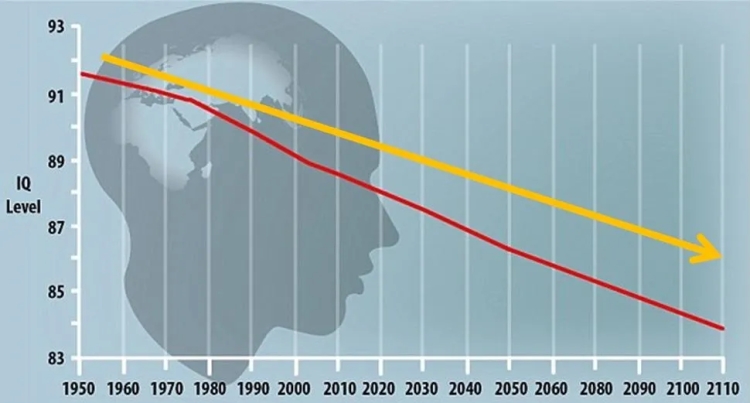The Decline of Intelligence: Are We Getting Dumber, or Just Different?
Every generation looks at the next and sighs, “Kids these days…” But behind the usual grumbling lies a more unsettling question: Are we witnessing a real decline in human intelligence? Are we becoming not just less wise, but literally less smart?

This question isn’t new, but it feels more urgent than ever. As social media flourishes, attention spans shrink, and misinformation spreads like wildfire, many are asking: Is something going wrong with our minds?
Let’s dig deeper—not to panic, but to understand what’s happening to our intelligence, and why it might not be what you think.
The Flynn Effect… in Reverse?
In the 20th century, psychologist James Flynn noticed something remarkable: across dozens of countries, IQ scores had been rising steadily. Each generation was scoring higher than the last—suggesting that, somehow, people were getting smarter.
This became known as the Flynn Effect, and for decades, it was a rare good-news story in human development.
But then something changed.
In the early 2000s, countries like Norway, Finland, Denmark, and even France began reporting declines in average IQ scores. Not by much—usually a few points per decade—but enough to reverse the trend. The "Flynn Effect" had stalled. In some places, it had flipped.
What’s Causing the Decline?
There’s no single smoking gun, but several suspects have emerged:
-
Education Quality and Method
Modern education often prioritizes standardized testing, memorization, and compliance. Creative thinking, critical reasoning, and curiosity—the hallmarks of deep intelligence—are sidelined. Kids may know how to pass exams, but not how to think for themselves. -
Digital Distraction
The human brain didn’t evolve for infinite scrolling. The constant stimulation from phones, games, and apps fragments our focus. Attention span, memory, and deep thought all suffer when we live in a world of pings and pop-ups. -
Nutrition and Environment
Malnutrition, pollution, and exposure to neurotoxins like lead and microplastics can affect cognitive development—especially in children. These factors don’t just influence health; they may literally shrink our intellectual potential. -
Decline in Reading and Reflection
Reading—especially long-form, complex texts—has been shown to boost verbal intelligence, empathy, and abstract thought. But who reads anymore? Not tweets. Not headlines. Books. Novels. Philosophy. That’s becoming rare.
But Wait—What Is Intelligence, Really?
Before we cry apocalypse, let’s ask: What do we mean by intelligence?
IQ tests measure certain kinds of problem-solving skills. But intelligence is multifaceted. Emotional intelligence, social intelligence, creative intelligence—they’re harder to quantify but just as vital.
It’s possible that what we’re losing in raw logic and focus, we’re gaining in adaptability, multitasking, or visual processing. After all, today’s world requires navigating new tools, languages, and systems constantly.
So maybe we’re not dumber—we’re different.
But that’s not an excuse for complacency.
A Culture That Doesn’t Value Thought
Perhaps the most dangerous symptom of this “decline” is cultural, not biological.
We live in an age where experts are distrusted, facts are debatable, and simplistic slogans trump nuanced truth. Intellectual humility has been replaced by outrage. Critical thinkers are drowned out by influencers.
In short: we are breeding a culture that devalues intelligence. And intelligence, when unappreciated, quietly recedes.
Can We Turn It Around?
Yes—but it will take intention.
-
Reclaim Deep Focus: Read long books. Turn off notifications. Embrace boredom. The brain grows in silence.
-
Teach Critical Thinking: Not just what to think, but how. Schools must shift from rote learning to intellectual exploration.
-
Celebrate Curiosity, Not Certainty: Real intelligence asks questions. It doubts. It evolves. We must reward that—not punish it.
-
Limit Screen Time for Kids (and Adults): Especially passive consumption. Tech isn’t evil, but unmanaged, it’s corrosive.
-
Restore the Value of Wisdom: Intelligence is nothing without context, compassion, and ethics.
A Final Thought
Intelligence is not a fixed trait—it’s a living flame. It needs fuel: books, dialogue, challenge, silence, wonder. And it needs protection—from noise, from nihilism, from the creeping normalization of mediocrity.
The real decline isn’t in our IQs, but in our collective appetite for thought.
And that? That can be rekindled.













